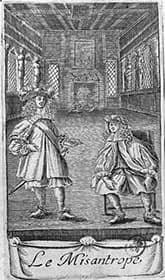The Misanthrope
Critique • Quotes • Translations
 First edition frontispiece
First edition frontispieceOriginally
Le Misanthrope
First performance
1666
Literature form
Play
Genres
Comedy
Writing language
French
Author's country
France
Length
Five acts, approx. 14,000 words
Misanthropes in prose or poetry
In the commentary on translations of Tartuffe, we discuss some particular problems of rendering Molière into English—namely, dealing with the long lines of French alexandrine verse and getting across Molière's humour. As with Tartuffe, translators of The Misanthrope opt for a variety of solutions, some eschewing poetry to go with straight prose, some adopting the common English verse form of rhyming iambic pentameter (shorter lines, that is), and still others dropping the rhyme altogether.
Personally I find prose easiest to read but it gives less of a sense of what Moliere's all about. Much of the wit is lost without the clever lines of poetry and the humour becomes broader—less subtle, more like an American sitcom.
This isn't necessarily fatal though and a prose version can certainly ease you into Molière. It has certainly proven a popular approach over the years with Henri Van Laun's 1876 translation still in print after more than a century and John Wood's more modern work in the 1959 Penguin edition (updated by David Coward in 2000) probably the biggest-selling translation of The Misanthrope.
A passage of The Misanthrope in four English translations.
Wood/Coward
ORONTE By Jove! Spoken like a man of sense! I admire you all the more for it! Let us then leave it to time to establish this happy relationship between us. Meanwhile I am entirely at your service. If there is anything I can do for you at court, I am known to cut some figure with his majesty.
Bishop
ORONTE. Parbleu! You speak like
the wise man that you are,
And I esteem you all the more for it!
Let us then trust to time to do its work,
And meanwhile, let me offer my devotion,
If you should need some influence at court,
I'm on excellent footing with the King.
Wilbur
ORONTE. By heaven! You're sagacious to the core;
This speech has made me admire you even more.
Let time, then, bring us closer day by day;
Meanwhile, I shall be yours in every way.
If, for example, there should be anything
You wish at court, I'll mention it to the King.
I have his ear, of course....
Harrison
ORONTE. Excellently put! Your insight and good sense
just make my hero-worship more intense.
If time will make us friends, I'll gladly wait,
but, in the meantime, please don't hesitate,
if there's anything at all that I can do,
Elyséewise, a place, an interview,
just say the word. Most people are aware
just what my standing is with those "up there".
A compromise is Morris Bishop's translation into blank verse in his 1957 collection Eight Plays by Molière. This approach retains some of the compact zip of Molière's text, missing from prose translations, while giving him greater freedom to select words to get across Molière's meanings without worrying about ending each line in an artificial rhyme, which is much harder to do in English than in French.
Somehow though, rhyme is funnier. Which may be why so many translators go for rhyming couplets. Richard Wilbur's 1955 translation was his first attempted and written to be read with no thought of performance, but it has turned out to be the modern standard and widely performed. The lines are colloquial, while keeping a few old expressions to give a sense of seventeenth-century talk. The rhymes sound unforced. It has been called the closest we have in English to Molière in French.
Brilliant British poet Tony Harrison (V. and Other Poems, 1990) takes the same approach further with an even more vigorous, though very literate, translation. He varies the rhythm, and occasionally the rhyme scheme, to suit the intent in each passage.
The purist however might prefer Maya Slater's translation into the long alexandrine lines that Molière used, found in her volume Moliere: The Misanthrope, Tartuffe, and Other Plays (2001).
Literally dozens of other translations of The Misanthrope are also available.
— Eric

